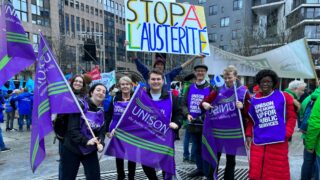GMB, UNISON and Unite - the unions representing 1.6 million local government workers – formally submited their pay claim to employers today. The claim steps up their campaign to put an end to poverty wages amongst the lowest paid group of workers in the public sector.
The unions seek a £1 an hour minimum increase to bring the bottom rate of pay in local government to the level of the Living Wage.
Half a million local government workers earn less than the current Living Wage and a million earn less than the Coalition’s ‘low pay’ threshold of £21,000 a year. The new Living Wage of £7.65 and £8.80 in London was announced yesterday.
Heather Wakefield, UNISON’s Head of Local Government, said:
“The government and local councils can’t have it both ways – they are overlooking the problem that is on their own doorstep.
“In the lead up to Living Wage Week, politicians from all parties talk about the need to end low pay and introduce the Living Wage. This must apply to local government workers, more than half a million of whom currently earn less than the Living Wage, and not just to those in the private sector.
“It is deeply disturbing to hear the stories of local government workers resorting to food banks. They have suffered an 18% drop in earnings since the government’s austerity measures were introduced. That’s why we want the same flat rate increase to be applied to everyone.
“More than 75% of the workforce are women, whose contribution has been consistently undervalued. This pay increase should be part of a new gender agenda to give our members the recognition they deserve in their pay packets.
“Our members have had enough of falling wages, redundancies and cuts to conditions and this campaign will signal an end to the exploitation they have suffered under this government’s austerity drive.”
Unite National Officer, Fiona Farmer, said:
“After a three year pay freeze, job losses and cuts to terms and conditions, local government workers are the lowest paid in public services.
“We are calling for fair pay for local government workers. The claim for £1 an hour will raise the pay of 500,000 of the very lowest paid to the Living Wage. The government must recognise and reward these workers for the contribution they make at a time when the demands on local services increase on a daily basis.”
GMB National Secretary, Brian Strutton, said:
“It’s time that the abject depression that has settled on local government since the 2010 election was lifted. Councils are starting to recognise that they cannot and should not cut services any more and their staff are demanding that they are no longer used as austerity cannon fodder.
“GMB members are telling us that they are ready to take action to break the cycle of pay restraint and that’s what we will be preparing the ground for. The claim we are lodging today is just the start of our campaign to win a fair deal for council staff.”
If local government workers had received pay increases at the level of inflation, half a million local government workers would now be earning £7.53 an hour – a Living Wage instead of a poverty wage. But they have had a four year pay freeze and the lowest paid are now £1,994 per year worse off in real terms than in 2010.
If a nursery nurse earning £17,802 in 2010 had received rises in line with inflation, she would now be earning £20,862.
Those on higher grades have taken a considerable pay cut in return for years of hard work in a stressful occupation. Some care workers have lost more than £5,000 in income in real terms since 2010.
Part-time workers have been particularly hard hit, their hourly earnings now worth the same as they were 10 years ago. Low paid part-time local government workers usually need benefits and tax credits to keep their families out of poverty, creating a false economy.





